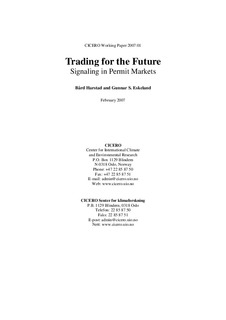| dc.contributor.author | Eskeland, Gunnar S. | nb_NO |
| dc.contributor.author | Harstad, Bård | nb_NO |
| dc.date.accessioned | 2014-03-17T14:31:20Z | |
| dc.date.available | 2014-03-17T14:31:20Z | |
| dc.date.issued | 2007 | nb_NO |
| dc.identifier.issn | 0504-452X | nb_NO |
| dc.identifier.uri | http://hdl.handle.net/11250/192292 | |
| dc.description.abstract | Tradable pollution permits are celebrated as a political instrument since they allow (i) firms to equalize marginal abatement costs through trade and (ii) they government to distribute the burden of the policy in a politically fair and feasible way. These two concerns, however, conflict in a dynamic setting. Anticipating that high-cost firms will receive more permits in the future, firms purchase excessive amounts of permits to signal high costs. This raises the price above marginal costs and distorts abatements. Prohibiting trade is better if the heterogeneity between the firms is small, if the (shadow) price for permits is large, and if the government redistributes permits frequently. Thus, important environmental problems should not be solved by tradable permits unless the government can commit not to intervene. | nb_NO |
| dc.language.iso | eng | nb_NO |
| dc.publisher | CICERO Center for International Climate and Environmental Research - Oslo | nb_NO |
| dc.relation.ispartof | CICERO Working Paper | nb_NO |
| dc.relation.ispartofseries | CICERO Working Paper;2007:01 | nb_NO |
| dc.title | Trading for the Future: Signaling in Permit Markets | nb_NO |
| dc.type | Working paper | nb_NO |
| dc.source.pagenumber | | nb_NO |
| dc.identifier.cristin | 855490 | |
